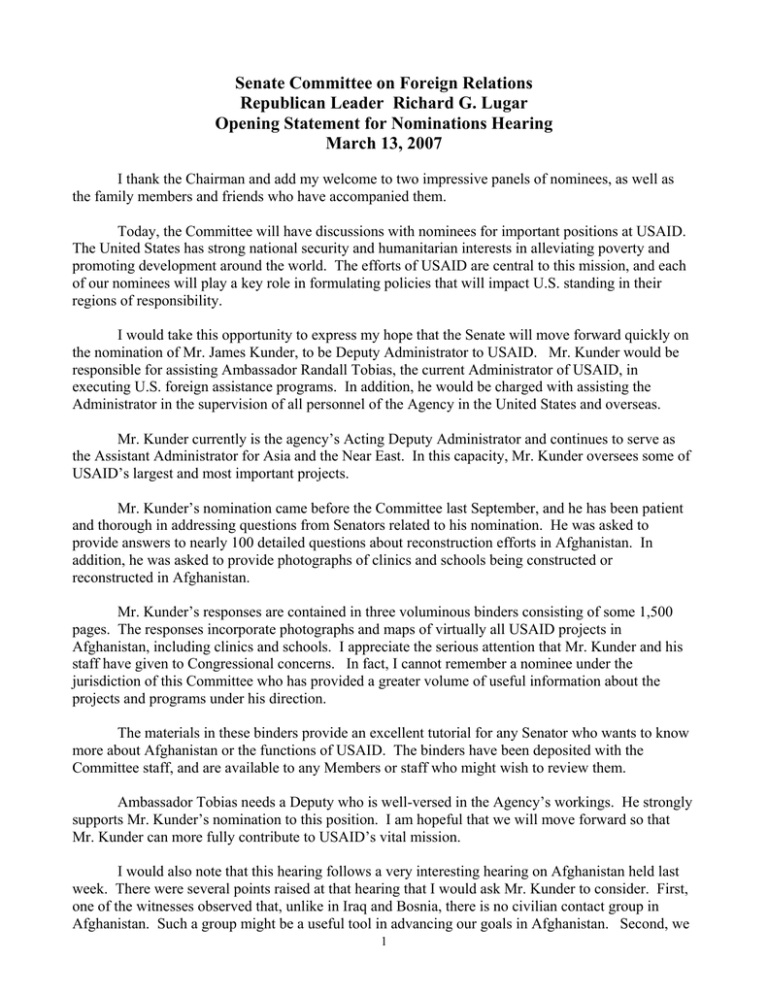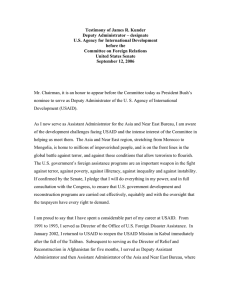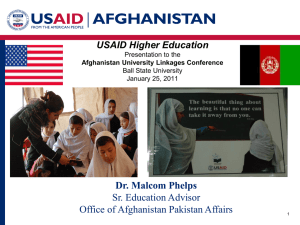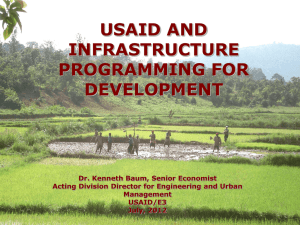Senate Committee on Foreign Relations Republican Leader Richard G. Lugar
advertisement

Senate Committee on Foreign Relations Republican Leader Richard G. Lugar Opening Statement for Nominations Hearing March 13, 2007 I thank the Chairman and add my welcome to two impressive panels of nominees, as well as the family members and friends who have accompanied them. Today, the Committee will have discussions with nominees for important positions at USAID. The United States has strong national security and humanitarian interests in alleviating poverty and promoting development around the world. The efforts of USAID are central to this mission, and each of our nominees will play a key role in formulating policies that will impact U.S. standing in their regions of responsibility. I would take this opportunity to express my hope that the Senate will move forward quickly on the nomination of Mr. James Kunder, to be Deputy Administrator to USAID. Mr. Kunder would be responsible for assisting Ambassador Randall Tobias, the current Administrator of USAID, in executing U.S. foreign assistance programs. In addition, he would be charged with assisting the Administrator in the supervision of all personnel of the Agency in the United States and overseas. Mr. Kunder currently is the agency’s Acting Deputy Administrator and continues to serve as the Assistant Administrator for Asia and the Near East. In this capacity, Mr. Kunder oversees some of USAID’s largest and most important projects. Mr. Kunder’s nomination came before the Committee last September, and he has been patient and thorough in addressing questions from Senators related to his nomination. He was asked to provide answers to nearly 100 detailed questions about reconstruction efforts in Afghanistan. In addition, he was asked to provide photographs of clinics and schools being constructed or reconstructed in Afghanistan. Mr. Kunder’s responses are contained in three voluminous binders consisting of some 1,500 pages. The responses incorporate photographs and maps of virtually all USAID projects in Afghanistan, including clinics and schools. I appreciate the serious attention that Mr. Kunder and his staff have given to Congressional concerns. In fact, I cannot remember a nominee under the jurisdiction of this Committee who has provided a greater volume of useful information about the projects and programs under his direction. The materials in these binders provide an excellent tutorial for any Senator who wants to know more about Afghanistan or the functions of USAID. The binders have been deposited with the Committee staff, and are available to any Members or staff who might wish to review them. Ambassador Tobias needs a Deputy who is well-versed in the Agency’s workings. He strongly supports Mr. Kunder’s nomination to this position. I am hopeful that we will move forward so that Mr. Kunder can more fully contribute to USAID’s vital mission. I would also note that this hearing follows a very interesting hearing on Afghanistan held last week. There were several points raised at that hearing that I would ask Mr. Kunder to consider. First, one of the witnesses observed that, unlike in Iraq and Bosnia, there is no civilian contact group in Afghanistan. Such a group might be a useful tool in advancing our goals in Afghanistan. Second, we 1 discussed whether a coherent U.S. program could be developed for providing U.S. foreign assistance directly to Eastern Afghanistan and the Federally Administered Tribal Areas in Pakistan, including Waziristan. Such a program would acknowledge the ethnic and tribal realities of the area. Obviously, this would not be an easy mission, but we should explore whether U.S. foreign assistance could make an impact in that region, given its importance to the outcome in Afghanistan. On our second panel, we will hear from nominees to be U.S. Executive Directors to International Financial Institutions. During the last four years, our Committee has held six hearings on the operations of the Multilateral Development Banks. Those hearings contributed to the Committee’s understanding of both the value of the MDB’s work and problems with their operations. In 2005, building on this work, I introduced S. 1129, the Development Bank Reform and Authorization Act. Most of the provisions of this bill were enacted into law in November 2005. With passage of this legislation, Congress made a strong statement that it recognizes the critical role of the MDBs in achieving development goals around the world, but also that the operations of these banks must be transparent and free of corruption. The U.S. government must work hard to ensure that this money is spent efficiently – both because of our responsibility to American taxpayers and because inefficiency and corruption undermine the basic humanitarian and foreign policy objectives of our participation in MDB financing. I congratulate our nominees and thank the Chairman. ### 2







